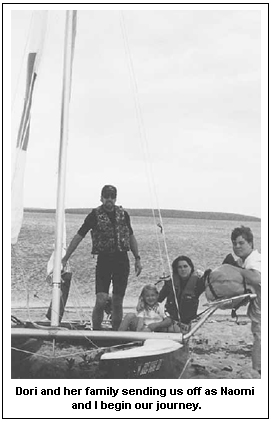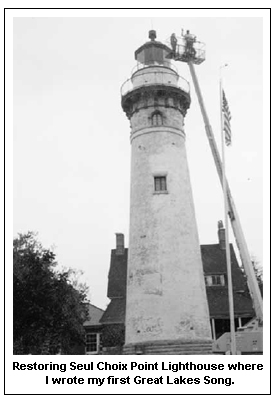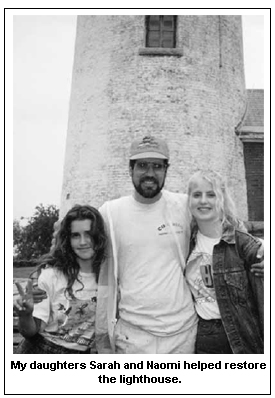| Adventure
Bound: A Father and Daughter Circumnavigate the
Greatest Lake in the World
by Carl Behrend
CHAPTER 10--THE TRIP
-Naomi’s Diary (Editor’s
Note: This is first in several entries from Naomi’s
travel diary that will be included in this text.
The entries will appear in italicized type)
 The
following summer found me busier than ever between
work, family and home. It seemed I didn’t
have a moment of spare time. It was already July
10th. I hadn’t even been out on my boat
yet. Naomi was the only one of my three children
left at home. She decided she would make the trip
around Superior with me. The
following summer found me busier than ever between
work, family and home. It seemed I didn’t
have a moment of spare time. It was already July
10th. I hadn’t even been out on my boat
yet. Naomi was the only one of my three children
left at home. She decided she would make the trip
around Superior with me.
We were frantically
packing and making last minute preparations. Jethro
came up to Munising Bay. He helped me set up the
boat the night before we were to leave. That’s
when we discovered that the control ropes, jib
sheets and headgear were missing. The thieves
who tried to steal my boat the year before must
still have these items. So instead of leaving
the next morning as planned, I had to run down
to Jethro’s place and borrow the headgear
off his boat. Luckily, his was the same as mine.
To do this took another three hours. So by the
time we got the boat packed and ready to go, it
was 5 p.m. Finally, Naomi and I were ready to
leave. My fiancé Dori and her two children
were there to see us off. We waived goodbye as
we sailed away.
Dad and
I were planning to start the trip at 9 a.m., but
as can be expected, things didn’t work out
as planned. Dad had to run down to Fayette to
get a part for the boat. Then we spent time packing
and dawdling until late in the afternoon. I stopped
and said goodbye to Sarah and Tim, and finally
Dori, Caleb and Alana saw us off from the mouth
of the Anna River. Strong winds helped us reach
Grand Marais just after sundown. The waves weren’t
very big and the weather alternated between sunshine
and clouds.
Would we make
it? What perils and adventures would lie ahead?
Could I really afford to take the time off? These
were all questions that were going through my
mind as Naomi and I waved goodbye and sailed into
the distance.
We moved slowly
out of Munising Bay. We could see Grand Island
to our left and the old East Channel Lighthouse
standing guard on its banks. The lighthouse is
a historic landmark that was help save the lighthouse
from the eroding waves of Lake Superior.
Our sails were
full as a southwest wind pushed us steadily along.
To our right was Miners Castle and the beautiful
Pictured Rocks National Lakeshore. The nation’s
first national lakeshore surely is a jewel in
the crown of Lake Superior. The sheer sandstone
cliffs, with their magical colors reflecting on
the blue-green waters of Lake Superior, are one
reason thousands of visitors take the tour boat
cruises each year. Boaters of all kinds cruise
the lakeshore to view these natural wonders.
We sailed on
past Portal Rock with its stone archway. It is
said that in the 1800s, there was another arch
there that was large enough for a schooner to
sail through. Erosion would eventually leave only
the existing arch, which is smaller, but still
majestic. 
Lacking a natural
harbor for safety, one of the most tragic early
shipwrecks on Lake Superior took place here along
the Pictured Rocks. The mishap occurred in 1856.
The side wheel steamer Superior, under Capt. Hiram
Jones, was caught in a storm blowing out of the
northwest. The boat almost made it to the shelter
of Grand Island. But the ship lost its rudder
and smokestack in high seas. The captain ordered
the anchors dropped. But the chains broke, leaving
the boat and its crew to be smashed to bits on
the Pictured Rocks Cliffs, just west of Cascade
Falls. Of the 66 crewmen aboard, only 18 bedraggled
survivors made it to shore. Capt. Jones was last
seen struggling to make it up onto the rocks.
He was washed off by huge waves and was last seen
in his beaver skin coat before he disappeared
into the waves.
An epic tale
of survival would follow. The first mate and the
engineer patched a lifeboat they found washed
ashore. The two men, with a few others, would
make it to Grand Island, to a trader’s cabin.
While the others trudged through the forest on
foot to be picked up later, two more sailors would
die of exposure. This was the worst loss of life
attributed to shipwrecks on Lake Superior up to
that time.
The wind pushed
us east past the Pictured Rocks, along Twelve
mile Beach. We could see the Au Sable Point Lighthouse
tower. Its beam of light alerts ships to the treacherous
Au Sable Reef.
We passed
Sable Point Lighthouse on the way here. The water
was indescribably purple dabbed with mercury silver
and liquid lead. The clouds were a moody blue
gray with a bright blue sky peeking through the
cracks. And Sable Point stood proud and white
contrasting with the dark trees its white tower
looking rose-colored. Beyond us stood the great
dunes looking white and purple against the dark
blue sky.
I think
God is blessing this trip. Before we left, we
asked him to be with us and we read the sailor’s
psalm (Psalm 107). I hope he continues to bless.
We are camped on the beach below the campground.
I’ve written too much. I’m going to
bed.
The reef had
often been the scene of shipwrecks and survival
struggles. The lonely lighthouses and keeper’s
quarters on the Great Lakes were many times used
to offer refuge to storm-tossed shipwreck survivors.
Sailing on past
the lighthouse, the beautiful Grand Sable Dunes
stretched for miles before us. Their sands piled
high, they reflected in the golden sunset. No
wonder the Native Americans gathered here to fast
and pray to the Great Spirit. You can’t
help but be awe inspired by the majestic beauty
of the dunes.
It was along
these shores, from the great dunes to Grand Island,
that the tales of the legendary Indian Hiawatha
are said to have been handed down. Henry Schoolcraft, U.S. Indian agent, and Lewis Cass, who
later would become governor of Michigan Territory,
stopped at Grand Island in 1820. It is said that
Schoolcraft, while on a westward expedition to
find the source of the Mississippi River, was
surprised to find no Indian settlement on Grand
Island. To his knowledge, there had been a sizeable
band of Ojibway Indians living there.
 The
mainland Indians told him there was an Indian
living on Trout Bay. They said he could tell the
story of what became of the Grand Island Ojibway
band. Cass and Schoolcraft dispatched a canoe
and brought back the Indian called Powers of the
Air. He seems to have been a “Last of the
Mohicans” type of Indian for the Grand Island
Band of Ojibways. He was able to tell Schoolcraft
the story of how the island band was forced to
join a war party from the mainland. They had to
fight the Sioux who lived to the west. The Grand
Islanders thought war was senseless and did not
care to join in. But when threatened with attack
from the mainland Ojibways, they finally agreed.
But they lost all of their men. Only Powers of
the Air escaped. Being the youngest and fastest
runner of the band, he was urged by the others
to make a break for it and get away. The
mainland Indians told him there was an Indian
living on Trout Bay. They said he could tell the
story of what became of the Grand Island Ojibway
band. Cass and Schoolcraft dispatched a canoe
and brought back the Indian called Powers of the
Air. He seems to have been a “Last of the
Mohicans” type of Indian for the Grand Island
Band of Ojibways. He was able to tell Schoolcraft
the story of how the island band was forced to
join a war party from the mainland. They had to
fight the Sioux who lived to the west. The Grand
Islanders thought war was senseless and did not
care to join in. But when threatened with attack
from the mainland Ojibways, they finally agreed.
But they lost all of their men. Only Powers of
the Air escaped. Being the youngest and fastest
runner of the band, he was urged by the others
to make a break for it and get away.
This story and
many other Native American legends were told to
Schoolcraft. He wrote them down and would later
loan his material to a man named Henry Wadsworth
Longfellow. Longfellow then wrote The Song of
Hiawatha based on some of these stories. Schoolcraft
and Cass continued on their voyage only to be
caught in a sudden storm, pulling in at the sands
of AuTrain, they waited out the storm. While they
were there, one of the party members was so impressed
with Powers of the Air he carved a likeness of
his face in the rock along the shore, and it’s
still there to this day! Loren Graham’s
book A Face in the Rock chronicles this story
in detail. The story also inspired me to write
this song:
FACE
ON THE ROCK
Face on the rock speak to me Tell me a tale of
how it used to be
On your island Grand, you’d run along the
sand
He was born
long ago to an island band of the Ojibways, Ojibways
Beneath the stars in his mother’s arms
She told him tales, sang him songs of days gone
by When she heard him cry
But Powers of
the Air he don’t live there no more
He don’t run along the shore
So take me back home, back home to yesterday-hey-hey
Take me back home, back home to yesterday
The ways of
peace were always known
But now the talk of war was heard On our island
home I was almost grown
Twelve brave men would sail away
But only one returned again Another day, another
day
All tribes of
men should live as one
Beneath the stars and the setting sun
So take me back home, back home to yesterday-hey-hey
Take me back home, back home to yesterday-hey-hey
The years would
pass, the white man came
Life would never be the same On our island home
I was all alone
In my dreams,
the beaver returned
The sound of song and laughter
Was heard again, was heard again
Tonight, I’ll
walk a path of the Milky Way
Gather me there with my family
Take me back home, back home to yesterday-hey--hey
Take me back home, back home to yesterday
Take me back
home to my island Grand, where I used to run along
the sand
Take me back home, back home to yesterday-hey-hey
Take me back home to yesterday
We hit
some pretty strong wind passing the dunes. It
made for fast sailing, but a little scary at times.
I was steering the boat when we got to Grand Marais
we saw a fire and pulled up to it, there were
some nice people there and we ended up sitting
and visiting with them half the night. They liked
to sing, so we sang (of course). One of the girls
had a pretty voice, kind of like Sarah McLaughlin.
They invited us to breakfast tomorrow. So I will
try to get their email address. The one lady is
kind of new age. She told stories about her fairy
encounters. They seem like nice interesting people.
I will never forget the sunset.
Arriving just
after dark at Grand Marais we saw a campfire on
the beach. Naomi and I pulled our boat up and
joined a small group of people around the fire.
We told them about our adventure plans of sailing
around Lake Superior. We also told them that we
sang Great Lakes songs. It was interesting to
find out that they were also singers and musicians.
I believe they called themselves “The Lakers.”
So we pulled out our little backpacker’s
guitar and sang a few songs for them. In the glow
of the campfire, we told stories and sang songs.
It was a wonderful way to start our trip around
Superior.
This is the
fifth of a series of excerpts from Carl Behrend’s
book Adventure Bound. For more information on
how to purchase books, CD’s or to arrange
bookings call (906) 387-2331 or visit www.greatlakeslegends.com.
TOP
|